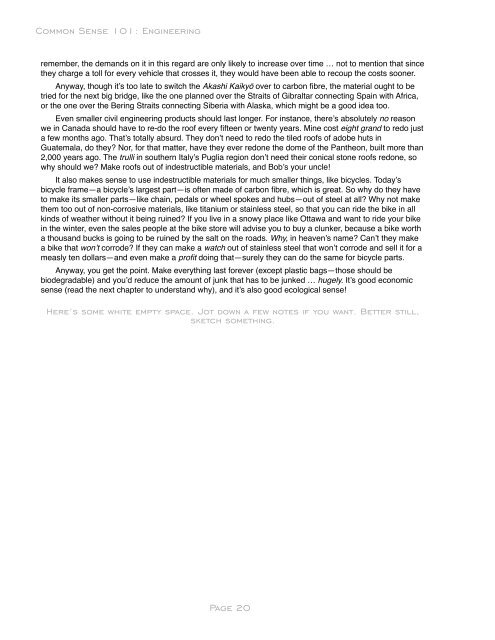Common Sense 101 - Engineering - December 16, 2012 Edition
Create successful ePaper yourself
Turn your PDF publications into a flip-book with our unique Google optimized e-Paper software.
<strong>Common</strong> <strong>Sense</strong> <strong>101</strong>: <strong>Engineering</strong><br />
remember, the demands on it in this regard are only likely to increase over time … not to mention that since<br />
they charge a toll for every vehicle that crosses it, they would have been able to recoup the costs sooner.<br />
Anyway, though it’s too late to switch the Akashi Kaikyō over to carbon fibre, the material ought to be<br />
tried for the next big bridge, like the one planned over the Straits of Gibraltar connecting Spain with Africa,<br />
or the one over the Bering Straits connecting Siberia with Alaska, which might be a good idea too.<br />
Even smaller civil engineering products should last longer. For instance, there’s absolutely no reason<br />
we in Canada should have to re-do the roof every fifteen or twenty years. Mine cost eight grand to redo just<br />
a few months ago. That’s totally absurd. They don’t need to redo the tiled roofs of adobe huts in<br />
Guatemala, do they? Nor, for that matter, have they ever redone the dome of the Pantheon, built more than<br />
2,000 years ago. The trulli in southern Italy’s Puglia region don’t need their conical stone roofs redone, so<br />
why should we? Make roofs out of indestructible materials, and Bob’s your uncle!<br />
It also makes sense to use indestructible materials for much smaller things, like bicycles. Today’s<br />
bicycle frame—a bicycle’s largest part—is often made of carbon fibre, which is great. So why do they have<br />
to make its smaller parts—like chain, pedals or wheel spokes and hubs—out of steel at all? Why not make<br />
them too out of non-corrosive materials, like titanium or stainless steel, so that you can ride the bike in all<br />
kinds of weather without it being ruined? If you live in a snowy place like Ottawa and want to ride your bike<br />
in the winter, even the sales people at the bike store will advise you to buy a clunker, because a bike worth<br />
a thousand bucks is going to be ruined by the salt on the roads. Why, in heaven’s name? Can’t they make<br />
a bike that won’t corrode? If they can make a watch out of stainless steel that won’t corrode and sell it for a<br />
measly ten dollars—and even make a profit doing that—surely they can do the same for bicycle parts.<br />
Anyway, you get the point. Make everything last forever (except plastic bags—those should be<br />
biodegradable) and you’d reduce the amount of junk that has to be junked … hugely. It’s good economic<br />
sense (read the next chapter to understand why), and it’s also good ecological sense!<br />
Here’s some white empty space. Jot down a few notes if you want. Better still,<br />
sketch something.<br />
Page 20



